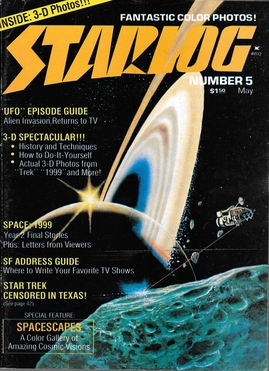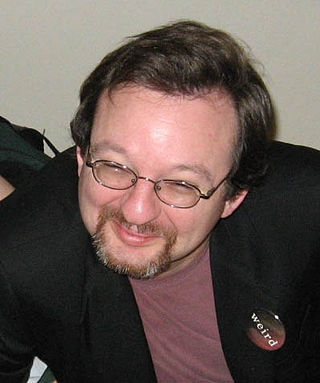Related Research Articles

Forrest James Ackerman was an American magazine editor; science fiction writer and literary agent; a founder of science fiction fandom; a leading expert on science fiction, horror, and fantasy films; a prominent advocate of the Esperanto language; and one of the world's most avid collectors of genre books and film memorabilia. He was based in Los Angeles, California.

Science fiction is a genre of speculative fiction, which typically deals with imaginative and futuristic concepts such as advanced science and technology, space exploration, time travel, parallel universes, and extraterrestrial life. Science fiction can trace its roots to ancient mythology. It is related to fantasy, horror, and superhero fiction and contains many subgenres. Its exact definition has long been disputed among authors, critics, scholars, and readers.
Syfy is an American basic cable television channel, which is owned by the NBCUniversal Media Group division and business segment of Comcast's NBCUniversal. Launched on September 24, 1992, the channel broadcasts programming relating to the science fiction, horror, and fantasy genres. As of January 2016, Syfy is available to 92.4 million households in America.
A hybrid genre is a literary or film genre that blends themes and elements from two or more different genres. Works in hybrid genres are also referred to as cross-genre, multi-genre, mixed genre, or fusion genre. The Dictionary of Media and Communication describes hybrid genre as "the combination of two or more genres", which may combine elements of more than one genre and/or which may "cut across categories such as fact and fiction". Some such sub-genres have acquired their own specialised names, such as comedy drama, romantic comedy ("rom-com"), horror Western, and docudrama.

CTV Sci-Fi Channel is a Canadian English language discretionary specialty channel owned by Bell Media. The channel primarily broadcasts speculative fiction and related programming.

SFX is a British magazine covering the topics of science fiction and fantasy. Its name is a reference to the abbreviated form of "special effects".

Starlog was a monthly science fiction magazine that was created in 1976 and focused primarily on Star Trek at its inception. Kerry O'Quinn and Norman Jacobs were its creators and it was published by Starlog Group, Inc. in August 1976. Starlog was one of the first publications to report on the development of the first Star Wars movie, and it followed the development of what was to eventually become Star Trek: The Motion Picture (1979).
Locus: The Magazine of The Science Fiction & Fantasy Field, founded in 1968, is an American magazine published monthly in Oakland, California. It is the news organ and trade journal for the English-language science fiction and fantasy fields. It also publishes comprehensive listings of all new books published in the genres. The magazine also presents the annual Locus Awards. Locus Online was launched in April 1997, as a semi-autonomous web version of Locus Magazine.

Ellen Datlow is an American science fiction, fantasy, and horror editor and anthologist. She is a winner of the World Fantasy Award and the Bram Stoker Award.

Scott Edelman is an American science fiction, fantasy, and horror writer and editor.

The British Fantasy Society (BFS) was founded in 1971 as the British Weird Fantasy Society, an offshoot of the British Science Fiction Association. The society is dedicated to promoting the best in the fantasy, science fiction and horror genres.
John Gregory Betancourt is an American writer of science fiction, fantasy and mystery novels, as well as short stories. He is also known as the founder and publisher, with his wife Kim Betancourt, of Wildside Press in 1989. In 1998, they entered the print on demand (PoD) market and greatly expanded their production. In addition to publishing new novels and short stories, they have undertaken projects to publish new editions of collections of stories that appeared in historic magazines.

Mir Fantastiki, officially abbreviated as MirF, is a Russian monthly science fiction and fantasy magazine. The name also refers to the website run by the magazine, Mirf.ru.
Fantasy Magazine is a monthly American online fantasy magazine that runs short fiction, poetry, and nonfiction.

Sean Wallace is an American science fiction, fantasy, and horror anthologist, editor, and publisher best known for founding the publishing house Prime Books and for co-editing three magazines, Clarkesworld Magazine, The Dark Magazine, and Fantasy Magazine. He has been nominated a number of times by both the Hugo Awards and the World Fantasy Awards, won three Hugo Awards and two World Fantasy Awards, and has served as a World Fantasy Award judge.

Lou Anders is the author of the Thrones & Bones series of middle grade fantasy novels. Anders is a Hugo Award-winning American editor, a Chesley Award-winning art director, an author and a journalist.
Tor.com is an online science fiction and fantasy magazine published by Tor Books, a division of Macmillan Publishers. The magazine publishes articles, reviews, original short fiction, re-reads and commentary on speculative fiction.
Angry Robot is a British-based publishing house dedicated to producing modern adult science fiction and fantasy, or as they call it “SF, F and WTF?!?”. The Nottingham-based company first released books in the UK in 2009, and since September 2010 has simultaneously been publishing its titles in the US as well, as a distributed client of Random House. All titles are released as paperbacks and eBooks.
A fantasy podcast is a podcast related to or discussing the fantasy genre, which usually focuses on the magical, supernatural, mythical, or folkloric. Fantasy stories are set in fictional universes or fantasy worlds that are often reminiscent of the Middle Ages and the early modern period. Despite having a fictional setting, fantasy stories can contain or reference locations, events, or people from the real world. Characters in these stories often encounter fictional creatures such as dwarves, elves, dragons, and fairies. Common types of fantasy podcasts are audio dramas, narrated short stories, role-playing games, or discussions and reviews of fantasy topics such as fantasy films, books, games, and other media. The intended audience of a fantasy podcast can vary from young children to adults. Fantasy podcasts emerged from storytelling and the creation of the radio. Fantasy podcasts have often been adapted into television programs, graphic novels, and comics. Fantasy podcasts are a subgenre of fiction podcasts and are distinguished from science fiction podcasts and horror podcasts by the absence of scientific or macabre themes, respectively, though these subgenres regularly overlap.
References
- ↑ "SciFi Now". Magazinesabout.co.uk. Archived from the original on 3 April 2010. Retrieved 17 September 2014.
- ↑ "Magazine Launch". Archived from the original on 20 February 2007. Retrieved 29 November 2019.
- ↑ "SciFiNow+ Back Issues".
- ↑ "Home". Fantasy Horror Award. Archived from the original on 10 July 2011. Retrieved 15 April 2019.